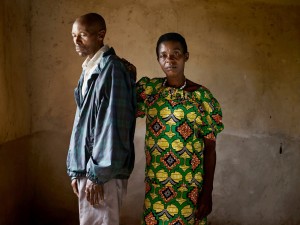What is forgiveness, anyway?
It’s such a strange, strange creature. As believers, we are recipients of the ultimate forgiveness of our sins by the price God paid in the death of His Son on the cross. For us.
We can’t even begin to understand that.
But we as fallen, sinful creatures in community and relationship with those around us, encounter either the need to forgive or be forgiven on a regular basis. We sin against each other. We hurt each other. Even in our best intentions. Even when we had no desire to cause harm, we sometimes cause harm.
Yesterday I stumbled across a portrait exhibition on forgiveness and reconciliation that absolute cut me to the core.
Many of you are familiar with the genocide that took place in Rwanda 20 years ago. Has it really been that long? Yes, it has. That frozen time in history saw some of the most horrific tribal killings, lootings, and destruction of property that we’ve seen. The story of the Hutu and Tutsi tribes was told in the movie “Hotel Rwanda”. Not an easy film to watch. But an important one. I’ve shown it to my teenage children–I want them to be aware of the violence that can be perpetrated by the evil that is in this world.
Anyway, yesterday as I was working my way through some blogs I like to read, I came across an article and portrait exhibition dedicated to the memory of the Rwandan genocide. I was unprepared for what I was about to see and read.
There is an ongoing national program of reconciliation and forgiveness in Rwanda, with the help of Association Modeste et Innocent, a non-profit organization. Slowly and miraculously, forgiveness and reconciliation is taking place between these two tribes. Only God could do such a thing. Here is an excerpt from the article:
In AMI’s program, small groups of Hutus and Tutsis are counseled over many months, culminating in the perpetrator’s formal request for forgiveness. If forgiveness is granted by the survivor, the perpetrator and his family and friends typically bring a basket of offerings, usually food and sorghum or banana beer. The accord is sealed with song and dance.
But what got me, were the pictures of perpetrators and survivors taken together, and their personal testimony of both why they asked for forgiveness, and why the survivor granted forgiveness. It’s a must-read. I wish there was some way I could get all of my friends and families to read this powerful article and see these images.
You can find the pictures and testimonies here: http://www.nytimes.com/interactive/2014/04/06/magazine/06-pieter-hugo-rwanda-portraits.html?_r=1 I urge you, I implore you, to click through and read these stories and view the pictures.
That the survivors were able to forgive–with much difficulty, I’m sure–such tremendous atrocities shames me into thinking “Who do I need to seek forgiveness from? For what do I need to go to God for honest repentance? Who am I not forgiving in my life, that my God would have me forgive?”
Forgiveness and reconciliation does not come easy. Asking for forgiveness sincerely and with repentance is some of the hardest soul work known to man. Granting forgiveness and reconciliation to someone who has hurt us or that we are angry with is also some terrifically difficult work. It takes true repentance on the side of the perpetrator. Real repentance. It takes humility on both sides of the issue or the act for forgiveness to take place. And, above all, it takes God working in the hearts of each person to lead to scriptural repentance, forgiveness and reconciliation.
But when it happens, it is a beautiful thing. When it happens, it is a God-given gift. When it happens, it is good and right and Biblical.
We need to be honest with ourselves about our need to both repent and to forgive. And I think we can gather some courage to do so from these Hutu and Tutsi tribe members. Because it takes courage to ask for forgiveness and to seek reconciliation. It takes courage to repent. And it takes courage to accept someone’s plea for forgiveness. It takes courage to forgive. It takes courage to be reconciled.
The Bible says much about repentance and forgiveness. I could list verse after verse here and probably still only scratch the surface of what our God has to say in His word about these subjects. I’ll close with only one, but would suggest that you (and I) take time this week to really search out to see what scripture has to say about both repentance and forgiveness and reconciliation.


